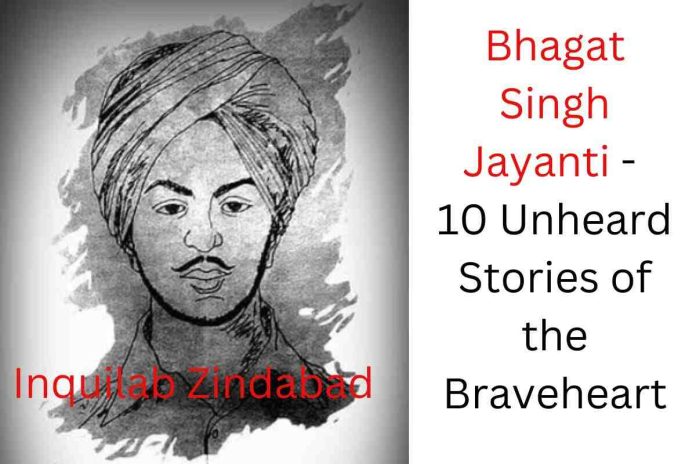Bhagat Singh’s life was marked by a passionate commitment to India’s freedom. Influenced by the Jallianwala Bagh massacre and the freedom struggle, he joined the fight for independence at a young age. Bhagat Singh became a member of the Hindustan Socialist Republican Association (HSRA), a revolutionary organization.
Bhagat Singh’s actions, such as the Assembly bombing and the Lahore Conspiracy Case, brought him into the limelight. He used non-violent methods whenever possible, but he believed in direct action to overthrow British rule.
His hunger strike in jail, demanding better treatment for political prisoners, gained widespread attention and support. Unfortunately, his life was cut short when he was hanged by the British colonial rulers on March 23, 1931, at the young age of 23.
Bhagat Singh’s Life
- Birth: Bhagat Singh was born on September 28, 1907, in a small village called Banga, which is now in Pakistan. His birthplace is located in the Lyallpur district of Punjab.
- Family: Bhagat Singh came from a patriotic family deeply involved in India’s struggle for freedom. His father, Kishan Singh Sandhu, and his mother, Vidyavati Kaur, instilled a sense of patriotism and social consciousness in him from an early age. He hailed from a Sikh Jat family known for their commitment to social and political reform.
10 Things Related to Bhagat Singh which you probably don’t know
On the occasion of Bhagat Singh Jayanti, we pay tribute to one of India’s most courageous freedom fighters by unveiling some lesser-known and unheard stories about this iconic figure.
- The Library Arson: Bhagat Singh and his associate Batukeshwar Dutt set fire to a British government-owned library. Why? To protest against repressive laws. This bold act was a statement of their determination to fight against injustice.
- Fasting in Jail: During his imprisonment, Bhagat Singh and other inmates embarked on a hunger strike to demand better treatment. Their determination and resilience sent a powerful message to the British authorities.
- The Assembly Bomb: Bhagat Singh threw a non-lethal bomb in the Central Legislative Assembly in Delhi to protest against repressive laws. He made sure the bomb didn’t harm anyone, intending only to make his voice heard.
- ‘Inquilab Zindabad’: Bhagat Singh’s powerful slogan ‘Inquilab Zindabad‘ (Long Live the Revolution) resonated with many Indians and became the rallying cry for the freedom movement.
- Education and Social Work: Apart from his revolutionary activities, Bhagat Singh was a well-read and intelligent individual. He founded the Naujawan Bharat Sabha to promote education and social reform.
- Idea of a New Society: Bhagat Singh envisioned an independent India with a just and equitable society. His vision extended beyond political freedom to social and economic justice.
- Call for Non-Violence: Contrary to the belief that Bhagat Singh was a proponent of violence, he firmly believed in non-violence as a principle. He resorted to radical actions only when peaceful methods failed.
- Love for Literature: Bhagat Singh had a deep love for literature and read extensively while in prison. His readings shaped his ideologies and commitment to the freedom struggle.
- Name Beyond Borders: Bhagat Singh’s legacy transcends national boundaries. He is admired worldwide for his courage and commitment to the cause of freedom.
- Eternal Martyr: Bhagat Singh’s sacrifice at a young age left an indelible mark on India’s struggle for independence. He continues to inspire generations with his unwavering dedication to the nation.
On this Bhagat Singh Jayanti, let us remember these lesser-known facets of this braveheart, whose life and sacrifice continue to ignite the flame of patriotism in the hearts of Indians.
Bhagat Singh’s sacrifice, patriotism, and unwavering commitment to the cause of India’s freedom continue to inspire generations. He remains a symbol of courage and selflessness in the struggle for justice and liberty.
Also Read: Battle of Haifa – The Last Great Cavalry Campaign in History



